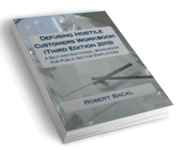Public Perceptions of Government Often Stuck In The Past
Q: Why is that so many people don't think of government when it comes to customer service?
Robert: Well, that's not strictly true. When firefighters save a home, or a life, people are very grateful. When police do good things, people do notice. Or, when government protects someone from their neighbour, that's appreciated to.
But still, lot's of people appear to have a negative perception of government, either in the form of mistrust, suspicion, sense of helplessness, or even hate. Their preconceptions often outweigh the good things that happen.
Q: But how does that happen -- that people don't notice the good things?
Robert: The complete answer is actually a little complex, and has to do with history, direct experience, basic human desire not to be told what to do, and the "lore" that's passed on from generation to generation.
The starting point is to understand that most governments were riddled with corruption, certainly into the 60's, and that it was "public knowledge" that corruption was rampant. And the period of corruption was quite long, so it' hard for people to psychologically "let go".
People develop a generalized and negative attitude or opinion about government that over-rides even the good things -- the good stuff gets ignored.
Q: So a lot of it is historical? Is it also cultural?
Robert: Indeed. It's hugely cultural and cultures change very slowly. For example, we know that perceptions of government vary a lot from country to country, particularly if one compares a country that has a history of dicatorship to one with a long history of democracy. Even if you compare democracies, let's say Canada, the United States, and Sweden, you'll find differences.
Q: You mention that nobody likes to be told what to do? How does that figure in?
Robert: Over the years I've worked with thousands of government staff, and perhaps the most persistent and universal observation from them is this: Citizens come to government to get them to regulate their neighbours, but when government tries to regulate them, all of a sudden they get mad. It's pretty simple, almost a truism. You want the police to nab that reckless driver who cut you off, but you don't want to get a ticket for speeding, even if it's deserved. Makes you mad, right?
Q: Yes, I think that's huge, but I know I don't connect getting caught, with others getting caught. Kind of a double standard.
Robert: Indeed, it is. Couple that selfishness, that's the best word I can think of, with cultural negative perceptions, and lack of trust, and history, and it's a pretty good explanation of why GOOD experiences with government customer service staff get quickly forgotten, while bad experiences seem to last a life time.
Q: Thanks, Robert. I expect there's other topics that will come out of our discussion today.
